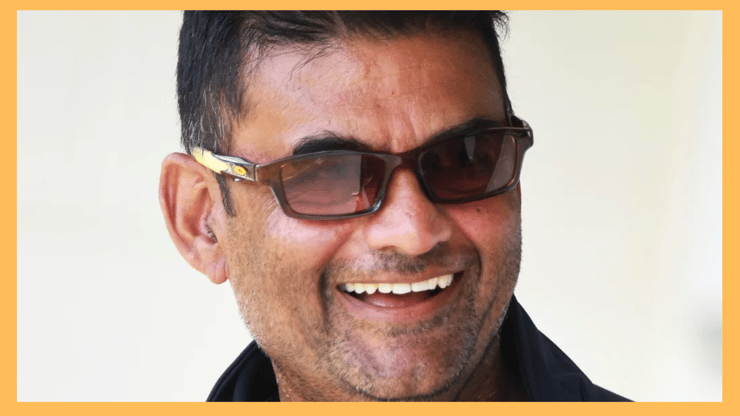Cricket: Dipak Patel On Fleeing Kenya, Discrimination, & A 50 Year Devotion

Given the obstacles his family had to face when he was just a boy, former Black Cap Dipak Patel sometimes asks himself how he managed to achieve what he has.
The 66-year-old has just retired from his role as director of cricket at Auckland's Kings College, which brings an end to a cricket devotion spanning 50 years.
From turning professional in 1975 as a 16-year-old, to a long coaching career post playing, it's been a huge chunk of his life.
"I've had a couple of minor jobs outside of cricket but other than that, cricket has been my life."
The off-spinning all-rounder became just the second player of Indian heritage to represent New Zealand in cricket when he debuted for the Black Caps in 1987. He was 28-years-old so it had not been a smooth path to playing international cricket.
Patel and his four siblings were all born in Kenya.
His father went there as a young man in the 1940s in search for work opportunities. In the 1950s he returned to India, got married, then Mr and Mrs Patel both went to Kenya.
His parents are from the Gujarat area, just north of Mumbai, from a little village called Dandi, which achieved world-wide prominence in 1930, when Mahatma Gandhi chose it as the destination for the Salt March against the British.
When Patel was 10 his family emigrated to England in 1968 during the Kenyan Asians Crisis, which led to a sudden exodus.
Thousands of Indians and Pakistanis from Kenya, who had British passports, had been arriving in the UK after facing increasing discrimination in Kenya.

Dipak Patel bowls during the 1996-97 England tour of New Zealand. Photo: © Photosport Ltd www.photosport.co.nz
But in February 1968, the British government decided it would no longer respect those passports and there was a sense of panic among the Asian community in Kenya to get to the UK before the door shut on them.
"Luckily we were British citizens so we managed to leave the country. Dad got the family out within 24 hours... arrived in England with a pair of shorts, and a T-shirt and it was about minus 2 degrees so it was a huge culture shock.
"I couldn't speak a word of English. I mainly spoke Gujarati and Swahili."
The family were able to live with an uncle in England for a few months. Then his mother rented a room, and they tried to adjust to a new life in West Bromwich, just outside of Birmingham.
"We had one room and six of us lived in that one room with two beds."
It was a pretty turbulent time for his family.
"Dad stayed behind in Kenya to try and tidy up things and he had a good job so he was able to support us in England but it wasn't until four years later that Dad joined us.
"In those days there were no phone calls, we weren't allowed to use the phone in the rental we had. It was pretty interesting times, we were only allowed to have a bath once a week, all those things that people take for granted.
"There were only certain times of the day that Mum was allowed to cook in the one kitchen that we shared with two other families."
More discrimination
England hardly put out the welcome mat for people like the Patels.
"The level of racism that we faced was really high. You were always petrified to go out in the evening, you were always encouraged to stay in because you'd get beaten up by the skinheads.
"In school you were constantly mocked and the racism was very blatant so you learnt very quickly and had to become resilient and unfortunately in those days it was just accepted that you were in a foreign country and you've got to deal with it."

Dipak Patel celebrates after taking a wicket against Pakistan. Photo: PHOTOSPORT
Patel turned to what he was good at - cricket. But that was also very challenging.
"Cricket in those days was played by the more affluent kids. I was the skinny little Indian boy turning up to play cricket with very limited equipment and clothing."
When Patel got his first county trial, he had to get three buses to get there, which his mother could barely afford.
"It's things like that, it sort of starts to dawn on you 'how the hell did you manage to do that?' when you've got limited resources to back you. In those days owning a car for Asians in England was a rarity so you just relied on public transport."
Patel said the discrimination he faced meant he had to work twice as hard coming through the cricket ranks.
"I'll never forget the day I signed my first contract and my father took me aside and told me that he and mum supported me doing this rather than go to university but said 'you've got to understand you're going to have to be twice as good as the local boy and if you're not going to accept that then I'd think twice' - that was the best piece of advice he gave me."
Patel always had that in the back of his mind right throughout his career whether he was playing in England or New Zealand.
"I'm in a foreign country and I'm not going to be accepted for who I am but at the same time if I kept performing, then hopefully that's good enough and I'll be recognised.
"My brothers were very good cricketers, particularly my eldest brother. I thought he was a far better cricketer than me and could have easily played country cricket but he couldn't put up with the racism and favouritism of the locals so he decided against pursuing it."
Moving country, again
Patel played county cricket for more than a decade before he emigrated to New Zealand in 1986, although he had spent several winters in Aotearoa leading up to the move.
He was in his late 20s but decided to move to the other side of the world after a very respectable 236 first-class matches for Worcestershire. He scored 9734 runs at 29.23, and took 357 wickets at 36.66 but it wasn't enough for England's national selectors.

Dipak Patel during the semi final against Pakistan at the 1992 Cricket World Cup, Eden Park, Auckland. Pakistan ended NZ's dream run at the tournament. Photo: ALAN_LEE
In the 1985/86 season, his first playing for Auckland, Patel scored 174 on debut, the highest-ever debut score for the province.
After two first-class seasons the New Zealand selectors took note and Patel made his Test debut in 1987, followed by his ODI debut.
Patel said getting named in the Black Caps was a huge source of pride for his family, especially given the fairly precarious situation his family had once been in.
"Particularly for my father, it was always his dream to have one of his sons go on and play international cricket so being able to do that, we lost him 16-17 years ago but he left us a very happy man."
Patel's parents, who settled permanently in England, visited Aotearoa a few times and his father watched him play in a World Cup in India, and a couple of Test matches in New Zealand.
"He was my biggest supporter but he was one of those guys ...he never praised me but he never rubbished me either. He was always proud of me but he always did it on the quiet."
Patel said touring India with the Black Caps several times was incredibly special. He now goes back to India frequently.
"Obviously going back to my grass roots from my parents perspective was something very special and yeah I have some wonderful memories from those tours."
Patel is inextricably linked to the 1992 World Cup. He was used as an opening bowler in an attempt to counteract the tactic of hitting over the in-field during the first 15 overs. The strategy was audacious for its time but it paid off, and he was often used in the same role in other matches.
The changing face of cricket
Patel has had a long coaching career since retiring from playing in 1997 at the age of 38.
He has coached a number of sides including Central Districts, the New Zealand under-19 team, and the Papua New Guinea national team.

Dipak Patel (left) when he coached Papua New Guinea. Photo: PNG Cricket
For the last seven years through his role at Kings College, Patel has seen the level of diversity on the cricket field vastly different to what he encountered when he first arrived in New Zealand.
The Indian population is now the third largest ethnic group in New Zealand.
"The emergence of Indian, Sri Lankans, Pakistanis that are coming through school level is phenomenal and it's increasing at a very quick rate and it's something that New Zealand Cricket need to tap into because it's a huge market.
"They are going to have to quickly embrace it and find ways to make sure that they are getting opportunities, which I don't think is quite happening at the grass roots level," he said.
"How can New Zealand Cricket make it more attractive for these Asian boys to come through the age groups and get the recognition so they can perform, because they're a lot more dedicated and have a bigger desire than the average Kiwi boy of playing for the Black Caps.
"There's still a barrier that they are having to face so interesting times for New Zealand Cricket I would think. Just being accepted into society as locals is the biggest challenge they face."

Lee Germon and Dipak Patel. NZ v Zimbabwe ODI series, 1995-96. Photo: © Photosport Ltd www.photosport.co.nz
Patel said cricket coaches and administrators also needed to be wary of player burnout.
"Boys and girls have got inflated ideas about their abilities to be able to go and play professional cricket. I think there needs to be an educational element introduced at school level to make them understand that there's only a very small percentage of people that make it to that level.
"Sometimes you wonder whether the kids are getting recognised far too early. And there's so much cricket available to watch on TV so you can understand why they have got that attitude that they want to become professional players but in New Zealand you've only got around 70 or 80 first class cricketers."
After decades of delivering throw downs, Patel is looking forward to putting his feet up and doing a bit of travel.
"My wife has given up a lot of years of being a cricket wife and it's time to pay back. I'm sure I'll be kept busy, I'm just looking forward to spending more quality time with my children and grandchildren and hopefully get to see my brothers and sisters in England."
Patel retires a happy man.
"Being able to achieve what I have done is something I'm very proud of."





